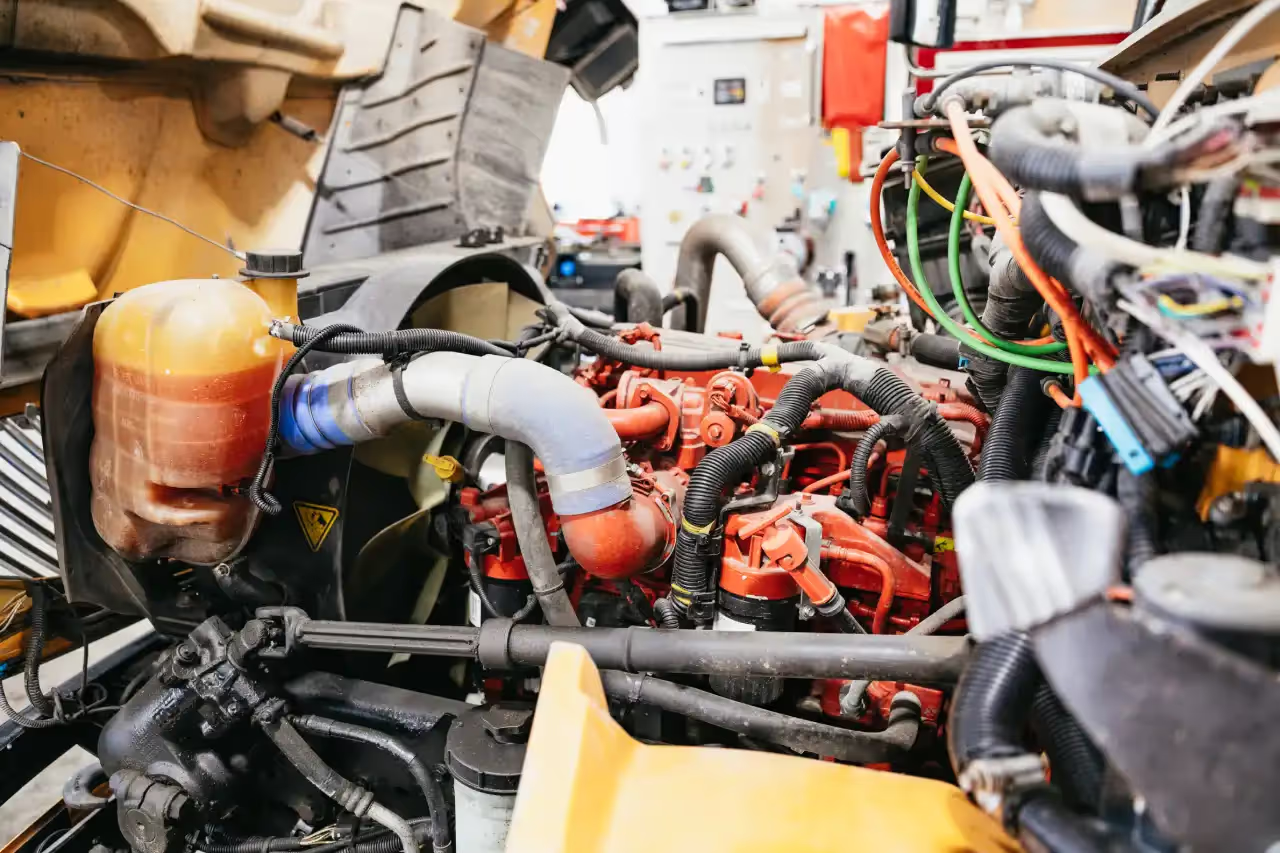Imagine this: you're hauling a critical load across state lines when your heavy-duty truck lurches and struggles to gain momentum. A failing truck clutch can leave you stranded on the side of the road, causing delays and impacting your bottom line. Clutch problems are a common concern for heavy-duty truck fleets, but with proper maintenance and early detection, they can be effectively managed.
This article, provided by SOS Truck & Trailer Repair, explores the signs of heavy-duty truck clutch trouble, common causes, and preventative measures to keep your fleet operating smoothly. By understanding how to identify and address truck clutch issues, you can minimize downtime and ensure your trucks stay on the road, delivering results.
The Crucial Role of the Clutch in Heavy-Duty Trucks
The clutch plays a critical role in a heavy-duty truck's drivetrain, acting as the link between the engine and the transmission. By engaging and disengaging the engine from the transmission, the truck clutch allows for smooth gear changes and enables the driver to bring the truck to a complete stop without stalling the engine.
A properly functioning clutch is essential for efficient operation and safe maneuvering of your heavy-duty vehicles. Just like any other crucial component, regular maintenance and attention to potential problems are key to ensuring the longevity and optimal performance of your truck's clutch.
Common Signs of Truck Clutch Problems in Heavy-Duty Trucks
Early detection of semi-truck clutch problems is crucial to prevent more extensive damage and costly repairs. Here are some tell-tale signs to watch for:
Burning Smell
A burning odor emanating from the clutch area is a strong indicator of overheating or excessive wear. This smell is caused by friction material burning due to slipping or dragging of the clutch components. If you detect a burning smell while driving, pull over to a safe location and shut down the engine immediately. Continuing to operate the vehicle with a burning clutch can lead to catastrophic failure and require a significant overhaul of the clutch system.
Gear Grinding
Difficulty shifting gears or grinding noises during gear changes can point to clutch disc wear or problems with the clutch linkage. When the clutch disc becomes worn, it loses its ability to fully engage with the flywheel, leading to slippage and difficulty engaging gears smoothly. Grinding noises during gear changes are a warning sign that shouldn't be ignored. Prompt attention to these signs can help prevent further damage to the clutch disc, flywheel, and other transmission components.
Clutch Chattering
A chattering sensation when releasing the clutch pedal can indicate contamination of the clutch disc or pressure plate with oil or grease. This contamination reduces the friction coefficient between the clutch components, leading to a grabbing or chattering feeling when engaging the clutch. Oil leaks from the engine crankshaft seal or transmission input shaft seal can cause this contamination. If you experience clutch chatter, it's important to identify the source of the contamination and address the leak to prevent further issues.
Clutch Pedal Feel
Changes in clutch pedal feel, such as increased stiffness, a spongy feeling, or a higher engagement point, can signal problems with the hydraulic system or clutch linkage. A properly functioning clutch pedal should have a smooth and consistent feel throughout its travel. Unusual resistance or a change in the engagement point can indicate worn components, air in the hydraulic system, or other issues that require professional attention. Ignoring these changes in clutch pedal feel can lead to more significant problems down the road.
Routine Inspections & Service Intervals
In addition to these signs, routine inspections are crucial for identifying potential clutch issues before they become major problems. Refer to your truck's manufacturer's recommendations for recommended service intervals for clutch inspections and component wear measurements.
For instance, most manufacturers recommend inspecting clutch components like the free play and grab height around the 500,000-mile mark to assess lining wear and potential issues. By proactively scheduling regular inspections and addressing minor problems early on, you can extend the lifespan of your truck's clutch and avoid costly repairs.
Common Causes of Truck Clutch Failure in Heavy-Duty Trucks
Several factors can contribute to truck clutch failure in heavy-duty trucks:
Overheating
Overheating is a major culprit in clutch wear and tear. This can be caused by excessive engine RPMs while engaging the clutch, overloading the truck, or towing more than the recommended weight capacity. Overheating can warp the clutch disc and pressure plate, leading to premature wear and clutch failure. Always adhere to the recommended weight limits for your specific truck model and avoid excessive engine RPMs while engaging the clutch to minimize overheating.
Riding the Clutch
The habit of keeping your foot resting on the clutch pedal while driving, also known as "riding the clutch," can lead to premature wear on the clutch disc and pressure plate. This constant engagement creates unnecessary friction and heat, accelerating the breakdown of the friction material on the clutch disc. Develop the habit of fully depressing the clutch pedal only when shifting gears and releasing it completely when the gear is engaged.
Improper Shifting
Harsh or abrupt gear changes can put excessive strain on the truck clutch components, accelerating wear and tear. Smooth and controlled gear changes are essential for clutch longevity. Take the time to master smooth gear changes to minimize stress on the clutch system. Double clutching, a technique used in older trucks without synchromesh transmissions, can also help to reduce wear on the clutch components.
Contamination
Oil or grease contamination on the clutch disc or pressure plate can significantly reduce their ability to grip, leading to slipping and clutch failure. Leaks from the engine crankshaft seal or transmission input shaft seal can cause this contamination. Maintaining a clean and leak-free engine and transmission is crucial for clutch performance. Regular inspections and prompt attention to any leaks will help prevent clutch contamination.
Troubleshooting Common Truck Clutch Bearing Issues
Heavy-duty truck clutches rely on various bearings to function properly. Here's how to troubleshoot common issues with these bearings:
- Throw-Out Bearing: A failing throw-out bearing may exhibit a whining or growling noise, particularly when depressing the clutch pedal. This noise indicates worn bearing surfaces and requires prompt attention to prevent further damage. Ignoring a failing throw-out bearing can lead to increased wear on other clutch components and eventually complete clutch failure.
- Pilot Bearing: Problems with the pilot bearing, located at the end of the crankshaft, can manifest as a rattling or chirping sound, especially when the clutch is engaged. Worn pilot bearings can also contribute to clutch misalignment and shorten the lifespan of other clutch components. A failing pilot bearing should be replaced as soon as possible to prevent further damage.
- Release Bearing: A failing release bearing can cause difficulty disengaging the clutch, making it challenging to shift gears smoothly. In some cases, the clutch pedal may become stuck or difficult to depress. If you experience any of these symptoms, it's important to have your truck clutch system inspected by a qualified technician to diagnose the problem and replace the failing bearing.
Final Words
A well-functioning truck clutch is essential for the smooth operation and efficient performance of your heavy-duty fleet. By understanding the signs of clutch trouble, common causes of failure, and preventative measures, you can keep your trucks on the road and avoid costly downtime. If you suspect any problems with your truck's clutch, don't hesitate to contact a qualified technician for a diagnosis and repair.
For expert heavy-duty truck clutch repair and maintenance services, look no further than SOS Truck & Trailer Repair. Our team of experienced technicians can diagnose and address any clutch issues your trucks may have, ensuring they keep rolling for miles to come. Contact SOS Truck & Trailer Repair today and schedule an appointment to keep your fleet operating at peak performance!





.svg)

